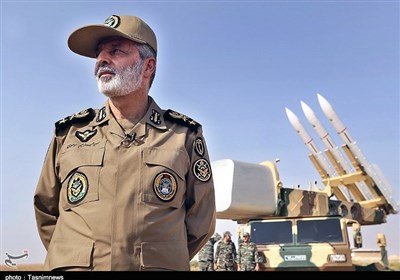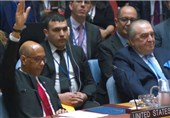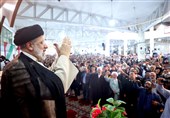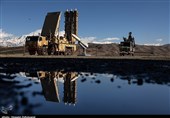US Has No Respect for Sides Involved in JCPOA Process: Russian Author
TEHRAN (Tasnim) – A Russian geopolitical analyst and author denounced recent US sanctions against Iran as a breach of the 2015 nuclear deal, known as the Joint Comprehensive Plan of Action (JCPOA), saying the move proved that Washington does not respect all sides involved in the deal.
“Yes, it is in violation of the JCPOA and a threat to diplomacy itself since there were hard negotiations with consensus agreed by all sides,” Leonid Savin said in an interview with the Tasnim News Agency, referring to Washington’s latest sanctions imposed against some Iranian individuals and companies under false pretexts.
“Now it proved that the US does not respect all sides involved in the process,” he said, adding, “It is also one more sign of the political hypocrisy of Washington.”
Savin is the head of the Administration of the International Social Movement “Eurasian Movement”. He is also the editor-in-chief of “Geopolitika” magazine as well as Geopolitica.ru. Furthermore, Savin, the author of several books on geopolitics, is the director of the social-political research programs in Russia’s Institute of Economics and Legislation.
Following is the full text of the interview:
Tasnim: As you know, recently, US President Donald Trump once again denounced the Joint Comprehensive Plan of Action (JCPOA), the nuclear deal between Tehran and the Group 5+1 (Russia, China, US, Britain, France, and Germany), as “one of the worst deals I've ever seen” and pledged to act on it later in October. As you know, as a candidate, Trump repeatedly slammed the deal as “horrible”, pledging to “tear up” the accord if elected. In your opinion, what are the reasons behind such harsh remarks and what geopolitical objectives is Trump pursuing?
Leonid: Usually for complex issues such as JCPOA there are no simple answers. So the decision made by Mr. Trump also has few layers. First is Donald Trump himself. He seems not so wise like what presented by his team during the election process. It is not just about Iran and JCPOA, but for many other deals, contacts, and problems. Second is Saudi Arabia factor. Personal meetings of Prince Mohammad bin Salman with Mr. Trump in the US and visit of Mr. Trump to Saudi Arabia (with the announcement of a big deal) present clear axis against Tehran. It is not a conspiracy theory, but a reality. Saudi Arabia would like to use any preemptive measures to decrease Iran’s power in the region. The third is Israel. We all remember panic and hysteria of Benjamin Netanyahu in UN as well as specific distorted Israeli frame about Iranian nuclear program. And Israel is also a good partner of the US. The Israeli lobby supported Trump and his idea to move the US embassy to Jerusalem, which shows the pro-Israeli policy of the White House (of course we need to add the role of Trump’s son in law Jared Kushner, who is one of the influential American businessmen with Jewish roots and Zionist agenda).
But when we look at this puzzle we could see one important picture. All these actions mean weakness of superpower and its allies and the limited arsenal of political tools. The world is changing, but some states are still in old dreams and do not want to wake up and learn from new opportunities. Therefore, we still see strange behavior from Cold war epoch. Washington just looking for “monsters” abroad to seek them and kill, but the problem is that most of “the monsters” sit inside of American consciousness.
Tasnim: According to media reports, the US has recently agreed to continue for now to exempt Iran from nuclear-related sanctions but imposed new embargoes on 11 Iranian people and companies, accusing them of trumped-up charges like involvement in cyber-attacks against the US financial system. Do not you think that the new sanctions are in violation of the spirit of the JCPOA? What would the move signal to the public opinion on Washington’s commitment to its international deals?
Leonid: Yes, it is in violation of the JCPOA and a threat to diplomacy itself since there were hard negotiations with consensus agreed by all sides. Now it proved that the US does not respect all sides involved in the process. It is also one more sign of the political hypocrisy of Washington. But it is one more lesson for Iran (and other countries too) that what would be the meaning of any deal with the United States. If there is no direct profit for the US, any agreement will be just a piece of paper that will be violated by Washington at any time.
Tasnim: Earlier this month, US House of Representatives voted to block sales of commercial aircraft to Iran. This is while, a number of Iranian airlines, including Iran Air and Iran Aseman Airlines, have signed deals with US plane-maker Boeing to buy nearly 180 airplanes. What problems can the decision by the US House of Representatives create for the agreements?
Leonid: For my opinion, any contract with Boeing is kind of investment to military-industrial complex of USA, because this company also produces military equipment and systems. Also from the point of view of developing the national economy, it is not good to pay abroad and better to start domestic aircraft projects. I agree that Boeing is respectful and famous company and label, but we have some alternative options (like Airbus) too. By the way, Russia did the same before and signed a deal to buy more Boeing aircraft. It was a mistake from the strategic point of view. Even if we need some parts of Boeing aircraft for current needs we need to remember that Russian domestic industry needs more support from the state.
Sanctions are a standard tool of US geopolitics and useful in many times before. Therefore, it is logical that the US House of Representatives follows this pattern. But they need to find another buyer, at least Trump promised to rebuild American industry and economics. So we will see what happens in second part of October when US report on JCPOA will be released and some actions need to be done.






